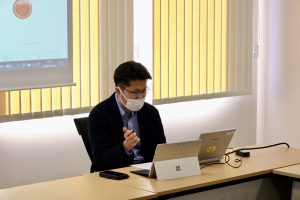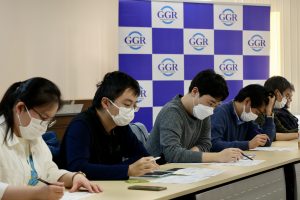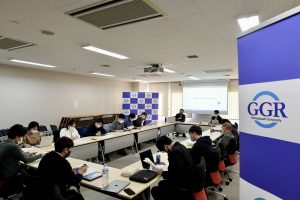On October 26, 2022, the Institute for Global Governance Research (GGR) held the 9th Brown Bag Lunch Seminar titled “How Did Japan-North Korea Trade Develop during the Cold War?” with Mr. Tani Kei (doctoral student at the Graduate School of Law, Hitotsubashi University; and a Japan Society for the Promotion of Science fellow) as the lecturer. Mr. Tani specializes in the diplomatic history of Japan and international relations in East Asia, and won the 14th Ishibashi Tanzan Newcomer’s Award for his paper titled “How Did Japan-North Korea Trade Develop during Negotiations for Normalization of Diplomatic Relations between Japan and the Republic of Korea? Focusing on the Japanese Government’s Decision Making.”
After clarifying a wide range of positions in diplomatic history, Mr. Tani analyzed the institutionalization of Japan-DPRK trade in the 1960s, with which the award-winning paper deals. He pointed out that previous studies had viewed Japan-DPRK trade in the context of mere “friendly trade” as a part of Sino-Japanese trade and the antagonistic relationship between the government and the business community. His threefold analysis presents a different image than previous studies have done. First, the economic importance of Japan-DPRK trade goes beyond “friendly trade” and its linkage with Japan-ROK relations. This includes the economic importance of the DPRK as a stable overseas market amid intensifying international competition, and the fact that the progress of Japan-DPRK trade was linked to the deterioration and improvement of Japan-ROK relations. Second, conflicts occurred within the government as well. He pointed out that there were disputes between the Ministry of Foreign Affairs (MOFA), the Ministry of International Trade and Industry (MITI), and the Ministry of Finance (MOF). While the first of these ministries emphasized Japan-ROK relations based on the “logic of the Cold War,” the second two sought to advance Japan-ROK trade based on “economic logic” according to their respective interests. Third, these two logics were at odds with each other. He argued that the “economic logic” declared by the MITI and MOF, as well as the business community, exceeded the “logic of the Cold War” supported by the MOFA, which led to the development of trade between Japan and the DPRK. He also pointed out that Japan showed an independent diplomatic attitude toward the US in its postwar diplomacy toward the Korean Peninsula.
During the Q&A session an active discussion ensued, with questions and answers on the actors involved – such as the intentions of China and DPRK and the workings of Japanese politicians – as well as on the analytical framework – such as the appropriateness of the term “logic” in this context. Mr. Tani is currently conducting comprehensive research on the Korean Peninsula, focusing not only on Japan-DPRK relations but also on Japan-ROK relations.
【Event Report prepared by】
NAKAJIMA Takahiro (Bachelor’s student, Faculty of Law, Hitotsubashi University)



